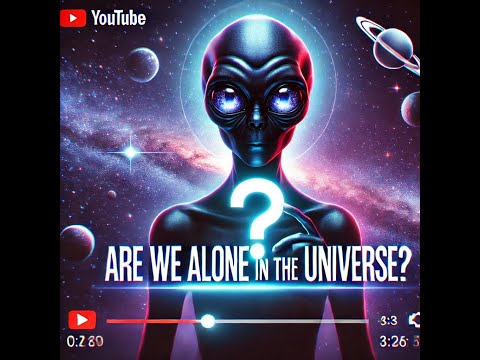Are we alone in the universe? Here is what NASA & Center for Astrophysics has to say?
🌌 Life Beyond Earth 🌌 – Join us as we dive deep into the possibilities of alien life and explore the wonders of the universe. This episode of our podcast covers intriguing scientific theories about extraterrestrial life, based on groundbreaking research from leading institutions like the
CENTER FOR ASTROPHYSICS
References:
https://www.cfa.harvard.edu/big-questions/does-life-exist-outside-solar-system
https://www.amnh.org/explore/news-blogs/interviews/extremophiles-and-life-beyond-earth
https://science.nasa.gov/exoplanets/search-for-life/
In this episode, we discuss:
What are Extremophiles?
How life on Earth survives in extreme environments and what this tells us about possible life on other planets.
The Goldilocks Zone:
Is Earth the only place where life can exist, or could life thrive on distant exoplanets and moons?
The Search for Intelligent Life:
Efforts by scientists to detect alien civilizations, from radio signals to advanced telescopes.
FAQs:
1. How many planets are there outside of our solar system?
We have confirmed thousands of planets beyond our solar system, also known as exoplanets. However, our galaxy likely holds trillions of planets, with a large fraction of them potentially in Earth’s size range.
2. What is the "habitable zone," and why is it important in the search for extraterrestrial life?
The habitable zone is the distance from a star where liquid water could exist on the surface of a planet. Every form of life that we know of requires liquid water, so planets within the habitable zone are considered more likely to harbor life.
3. What is the "Fermi Paradox"?
The Fermi Paradox highlights the contradiction between the vastness of the universe, the high probability of extraterrestrial life, and the lack of evidence for such life. Physicist Enrico Fermi famously questioned, "Where is everybody?" considering that the universe is billions of years old, even at slow travel speeds, there has been ample time for intelligent, technological lifeforms to traverse the galaxy.
4. How do scientists search for exoplanets?
One of the main methods used is the "transit method," where telescopes like TESS and Kepler look for dips in a star’s light as a planet passes in front of it. This method allows scientists to infer the size and orbit of the planet.
5. What are extremophiles, and how do they relate to the search for extraterrestrial life?
Extremophiles are organisms that thrive in extreme environments on Earth, such as in the deep ocean, in highly acidic or alkaline conditions, or at extreme temperatures. Studying these organisms expands our understanding of the conditions under which life can exist and informs our search for life on other planets with potentially harsh environments.
6. What is the Drake Equation?
The Drake Equation is a mathematical formula that attempts to estimate the number of detectable, intelligent civilizations in our galaxy. While many of the variables in the equation are still unknown, it provides a framework for considering the factors that might contribute to the existence of extraterrestrial life.
7. What is the next generation of technology being developed to search for life?
One exciting development is the Giant Magellan Telescope (GMT). This massive ground-based telescope will be able to detect the chemical composition of exoplanet atmospheres, potentially revealing biomarkers like oxygen that could indicate the presence of life.
8. What kind of signals are scientists looking for in the search for intelligent extraterrestrial life?
Scientists at the SETI Institute use radio telescopes to search for signals that are limited to a specific frequency on the radio dial, a characteristic of artificial transmitters, unlike the broad-spectrum noise produced by natural phenomena. They are looking for signals that stand out from the background noise of the universe.
🎧 Perfect for passive listening, this podcast is a mix of science, speculation, and the age-old question: Are we alone in the universe?
🔔 Subscribe for more content on space, science, and the mysteries of the cosmos!
#LifeBeyondEarth, #ExtraterrestrialLife, #SpacePodcast, #AlienLife, #Astrobiology, #SETIInstitute, #SciencePodcast, #SpaceExploration, #GoldilocksZone, #Universe, #Astronomy, #Cosmos, #OuterSpace, #SpaceScience, #AlienCivilizations, #IntelligentLife, #PossibilityofLifeBeyondEarth, #SearchingforAlienLife, #AreWeAlone, #ExtremeLifeForms



